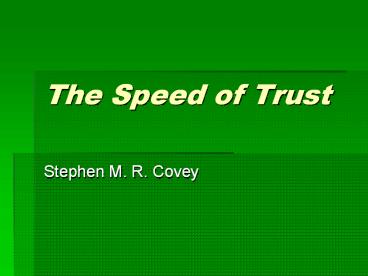The Speed of Trust - PowerPoint PPT Presentation
1 / 28
Title: The Speed of Trust
1
The Speed of Trust
- Stephen M. R. Covey
2
What is trust?
- What are two key areas where confidence is
important if trust is to be established? - Integrity
- Abilities
3
Distrust
- Distrust involves suspicion of a persons
integrity, agenda, capabilities, and/or track
record.
4
High-trust relationships
- Describe one such relationship.
- How does it feel?
- How well do you communicate?
- How quickly can you get things done?
- How much do you enjoy this relationship?
5
Low-trust relationships
- Describe one such relationship.
- How does it feel?
- How well do you communicate?
- How quickly can you get things done?
- How much do you enjoy this relationship?
6
Economics of Trust
- What is this?
- How would you evaluate this?
7
- What is the trust tax?
- An added cost to work, relationships, all
activities, that comes from a lack of trust - What is the trust-dividend?
- Improvement in communication, collaboration,
execution, innovation, strategy, engagement,
partnering, and relationships created by a
high-trust environment
8
Trust Myths
- Trust is soft
- Trust is slow
- Trust is built soley on integrity
- You either have trust or you dont
- Once lost, trust cannot be restored
- You cant teach trust
- Trusting people is too risky
- Trust is established one person at a time
- What do you think about Coveys response to these
myths?
9
What are the five waves of trust?
- Self-Trust
- Relationship Trust
- Organizational Trust
- Market Trust
- Societal Trust
10
What are the four cores of credibility?
- Integrity
- Intent
- Capabilities
- Results
11
TAKE THE FOUR CORES OF CREDIBILITY ASSESSMENT AND
SCORE YOURSELF. HOW DID YOU DO? WHAT ARE YOUR
AREAS OF WEAKNESS? HOW WILL YOU WORK TO INCREASE
YOUR AREAS OF WEAKNESS? WHAT WILL YOU BE DOING
TO MAINTAIN YOUR STRENGTHS?
12
- According to Covey, relational trust is all about
consistent behavior. How do you feel about that
statement? - Why might behavior matter? Is it really possible
to change ones behavior? Arent people pretty
much going to behave the same throughout all of
their lives? - What do you think about Coveys ideas related to
trust accounts?
13
- Of the thirteen behaviors Covey develops in the
section on relational trust, which do you see as
most critical to you personally? to the
Undergraduate school? To Moody Bible Institute?
14
Take the Thirteen Behaviors Assessment for bout
yourself and the Undergraduate School and score
both assessments. How did you do? How did the
Undergraduate school do? Were the results
similar? different? How so? How do we work to
improve on both fronts?
15
- Why is straight talk so important? How are we
doing on the straight talk issue in the
Undergraduate school? Do we suffer from straight
talk going to far?
16
- How are we doing at demonstrating respect? How
can we demonstrate that we care?
17
- Is the Undergraduate school a transparent
environment? Is there an information
withholding going on? How can we work to
eliminate any trust tax we may be paying due to
lack of transparency?
18
- How do we do at righting wrongs? Can you think
of any wrongs, for which we are responsible,
which we have the capacity to right this week?
this semester? this year? Just because someone
is offended by an action, does that mean there is
a wrong that must be righted?
19
- Is the Undergraduate school a place where loyalty
is demonstrated? What evidence do we have to
support our conclusion? What are the keys to
strengthening this area?
20
- Do we deliver results? What measurements do we
have in place to know whether or not were
delivering? What would your department and the
Undergraduate school look like if we were
accomplishing this completely?
21
- Are we better this year when compared with last
year? Is the Undergraduate school a place where
people see we are striving to be better? What
tangible evidence do we have that we are getting
better?
22
- Is the Undergraduate school a place where we
confront reality? Where are we doing a great job
at confronting reality? What is the number one
reality that we are not confronting in the
Undergraduate school?
23
- What does it mean to clarify expectations? How
are we doing at this? Is it important given the
nature of the work we do to do this? Doesnt
everybody know what is expected of them?
24
- How are we doing at the practice of
accountability? How would this practice show
itself in the Undergraduate school? When things
go wrong, what happens here?
25
- When we talk about critical issues do we listen
first? When we listen are we really listening or
are we working on our reply or explaining away
what is being said? Key to listening is trying
to understand the other person. Is that
something that happens in the Undergraduate
school? Do you feel listened to when you speak?
26
- How are we doing at keeping our commitments? Can
we point to any commitments weve made in the
last couple of years which weve kept? What
outstanding commitments do we need to keep.
27
- What does extending trust mean? What does it not
mean? What is the difference between extending
trust abundantly and extending trust
conditionally? How do we know if we are
extending trust appropriately?
28
- What jumped out at you while reading the book
that we havent discussed yet? - What does all this mean for the Undergraduate
school this year? - What else do we need to say about this book and
the Undergraduate school?































